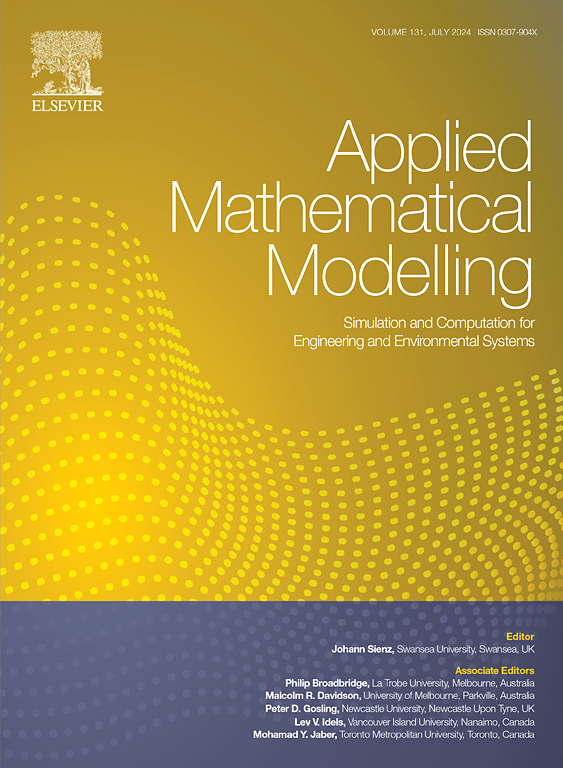Model-free approach for inferring residence time distribution and its applications
IF 4.4
2区 工程技术
Q1 ENGINEERING, MULTIDISCIPLINARY
引用次数: 0
Abstract
Residence Time Distribution (RTD) is an important concept for optimizing chemical processes, but conventional RTD studies have limitations, such as being sensitive to experimental errors, oversimplifying the system, or being computationally expensive. This study proposes a novel numerical algorithm that accurately and robustly computes the RTD based on data points without assuming any predetermined model. The proposed method employs B-spline regression analysis with fixed-point iteration (FPI), a technique commonly used in the field of rheology to calculate the relaxation time spectrum. Our algorithm estimates accurate RTDs using B-spline regression analysis and guarantees non-negative RTD values using the FPI method. We use simulation data, both error-free and error-included, to verify the optimal conditions of the algorithm. We identify the optimal conditions of the algorithm, confirming that it can accurately compute RTDs regardless of the shapes of the input function and the RTD. Through experimental and CFD data, we verify that the algorithm computes consistent RTDs regardless of the input function when sufficient data are provided. Our RTD calculation algorithm can calculate RTD regardless of any input data and does not use a predefined model, so it is expected to be effectively utilized in RTD analysis of complex systems such as twin-screw extruders, stirred tank reactors, and pharmaceutical manufacturing systems.
推断停留时间分布的无模型方法及其应用
停留时间分布(RTD)是优化化学过程的一个重要概念,但传统的RTD研究存在局限性,如对实验误差敏感、系统过于简化或计算成本高。本文提出了一种新的数值算法,可以在不假设任何预定模型的情况下,准确、稳健地计算基于数据点的RTD。该方法采用流变学领域常用的b样条回归分析和定点迭代(FPI)技术来计算松弛时间谱。我们的算法使用b样条回归分析估计准确的RTD,并使用FPI方法保证非负RTD值。我们使用无误差和含误差的仿真数据来验证该算法的最优条件。我们确定了算法的最优条件,证实了无论输入函数和RTD的形状如何,它都可以准确地计算RTD。通过实验和CFD数据验证,在数据充足的情况下,无论输入函数如何,该算法都能计算出一致的rtd。我们的RTD计算算法可以在不考虑任何输入数据的情况下计算RTD,并且不使用预定义模型,因此有望有效地用于双螺杆挤出机,搅拌槽式反应器和制药制造系统等复杂系统的RTD分析。
本文章由计算机程序翻译,如有差异,请以英文原文为准。
求助全文
约1分钟内获得全文
求助全文
来源期刊

Applied Mathematical Modelling
数学-工程:综合
CiteScore
9.80
自引率
8.00%
发文量
508
审稿时长
43 days
期刊介绍:
Applied Mathematical Modelling focuses on research related to the mathematical modelling of engineering and environmental processes, manufacturing, and industrial systems. A significant emerging area of research activity involves multiphysics processes, and contributions in this area are particularly encouraged.
This influential publication covers a wide spectrum of subjects including heat transfer, fluid mechanics, CFD, and transport phenomena; solid mechanics and mechanics of metals; electromagnets and MHD; reliability modelling and system optimization; finite volume, finite element, and boundary element procedures; modelling of inventory, industrial, manufacturing and logistics systems for viable decision making; civil engineering systems and structures; mineral and energy resources; relevant software engineering issues associated with CAD and CAE; and materials and metallurgical engineering.
Applied Mathematical Modelling is primarily interested in papers developing increased insights into real-world problems through novel mathematical modelling, novel applications or a combination of these. Papers employing existing numerical techniques must demonstrate sufficient novelty in the solution of practical problems. Papers on fuzzy logic in decision-making or purely financial mathematics are normally not considered. Research on fractional differential equations, bifurcation, and numerical methods needs to include practical examples. Population dynamics must solve realistic scenarios. Papers in the area of logistics and business modelling should demonstrate meaningful managerial insight. Submissions with no real-world application will not be considered.
 求助内容:
求助内容: 应助结果提醒方式:
应助结果提醒方式:


